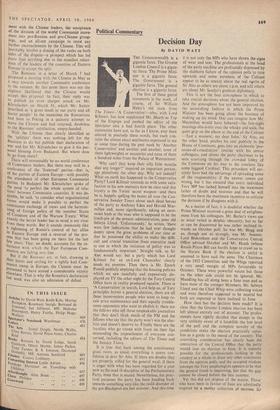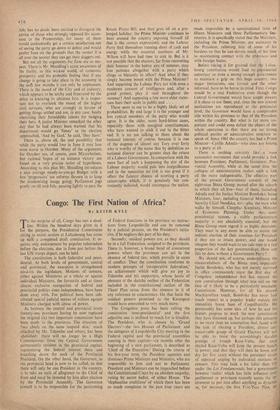Political Commentary
Decision Day
By DAVID WATT
THE Commonwealth is a gigantic farce. The Greater London Council is a gigan- tic farce. The Prime Mini- ster is a gigantic farce. The Government is a gigantic farce. The general election is a gigantic farce.
The first of these genial statements is the work, of course, of Sir William Haley's old mate from The Times—`A Conservative'—who, with Lord Kilmuir, has now supplanted Mr. Heath as Top of the Unpops and pushed the editor of the Spectator into a bad fourth place. The other statements have not, so far as I know, ever been uttered in precisely these words, but each con- tains the almost exact sentiments expressed to me at some time during the past week by 'Another Conservative' and another and another, none of them lightweights or eccentrics and none of them a hundred miles from the Palace of Westminster.
`Why can't they keep their silly little mouths shut any longer?' inquired an important person- age plaintively the other day. Why not indeed? What on earth has happened to the Conservative Party? Lord Kilmuir reminds us with some satis- faction in his new memoirs how he once said that loyalty is the Tories' secret weapon—and there he is, happily spilling the beans all over the Con- servative Sunday Times about such dead heroes of the party as Anthony Eden and Harold Mac- millan and, more significantly, taking an enor- mous bash at the man who is supposed to be the lynch-pin of the present administration, poor old Selwyn LlOyd. 'Unfortunately,' he writes, 'there were few indications that he had ever thought deeply upon the great problems of our time or that he possessed the ability to make the diffi- cult and crucial transition from executive rank to one in which the initiation or policy was so fundamentally important.' Straight talk, as Sir Alec would say; but a party which has Lord Kilmuir for an ex-Lord Chancellor clearly needs no enemies. Then there is Mr. Enoch Powell publicly implying that the housing policies which we saw tastefully and expensively dis- played on TV the other night by the Tory Central Office have in reality produced squalor. There is 'A Conservative' in search, Lord help us, of Tory principles before a general election; there are all these inconvenient people who want to keep re- sale price maintenance and their equally trouble- some opponents who want to abolish it; there are the fellows who te)l those unspeakable journalists that they don't think much of the PM and the fellows who say that the party won't win the elec- tion and doesn't deserve to. Finally there are the loyalists who go round with foam on their lips demanding the impeachment of everyone con- cerned, including the editors of The Times and the Sunday Times.
It is true that back among the constituency grass roots, as usual, everything is sunny con- fidence in dear Sir Alec. If there are doubts they are properly stifled for the general weal; if there is anger with what has been regarded for a year now as the mad ill-discipline of the Parliamentary Party, even that is muted. Nevertheless, for prac- tical purposes the party has been heading back towards something very like the twilit disorder of the pre-Blackpool era last summer. And this time it is not only the.MPs who have shown the signs of wear and tear. The professionals at the head of the party machine are profoundly depressed by the stubborn failure of the opinion polls to turn upwards and some members of the Cabinet appear to be as uneasy about the real merits of Sir Alec as others are about r.p.m. and still others are about Mr. Sandys's gunboat diplomacy.
This is not the best atmosphere in which to take crucial decisions about the general election, And the atmosphere has not been improved by the astonishing fashion in which the Prime Minister has been going about the business of making up his mind. One can imagine how Mr. Macmillan would have behaved—the late-night meetings tete-a-tete over the whisky and soda, the quiet grip on the elbow at the end of the Cabinet =Just a moment, my dear John.' Sir Alec, on the other hand, pitches his tent publicly in the House of Commons, goes into an elaborate 'pro- cesses-of-consultation' routine with his senior colleagues, and allows the party chairman to be seen scurrying through the crowded lobby of the Commons on his way to the conclave like some laggard Cardinal. This procedure will cer- tainly have had the advantage of spreading some of the responsibility if the answer comes out wrong, but it has ensured that every individual Tory MP has lashed himself into the maximum lather of doubt and neurosis and that he will therefore have the maximum incentive to criticise the decision if he disagrees with it.
As a matter of fact, it is doubtful whether the Prime Minister received a great deal of enlighten- ment from his colleagues. Mr. Butler's views are as usual veiled in delphic obscurity, but so far as can be discovered he was rather inclined to- wards an October poll. So was Mr. Hogg and so, though not so strongly, was Mr. Soames. Lord Blakenham and the Conservative Central Office advised October and Mr. Heath (whose Resale Prices Bill can hardly hope to crawl on to the Statute Book if the election is early) is assumed to have said the same. The Chairman of the 1922 Committee and the Whips reported a very 'small margin of MPs favourable to October. These were powerful voices but those on the other side could not be ignored. Mr. Maudling has all along been a June man and so have most of the younger Members. Mr. Selwyn 'Lloyd and the Chief Whip were collecting voices and were therefore supposed to be neutral but both are reported to have inclined to June.
How then has the decision been made? It is clear that the Greater London election has been left almost entirely out of account. The profes- sionals have rightly decided that except in the very unlikely event of a landslide the low level of the poll and the complete novelty of the conditions make the election practically value- less as a guide to the mood of the country. The overriding consideration has clearly been the conviction of the Central Office that the party would lose an election in June. It is scarcely possible for the professionals looking at the country as a whole to draw any other conclusion from the opinion polls, and the accepted wisdom amongst the Tory psephologists appears to be that the general trend is improving, but that the gap cannot be closed before the late summer.
Yet this did not dispose of the matter. Those who have been in favour of June are admittedly inspired by a motley collection of motives. Sir
Alec has no doubt been entitled to disregard the advice of those who strongly opposed his acces- sion to the Premiership, for many of them would undoubtedly get a certain satisfaction out of seeing the party go down to defeat and would prefer June on the grounds that the sooner it is all over the sooner they can get their daggers out.
But not all the arguments for June are so sus- pect. There is Mr. Maudling's acute awareness of the frailty, in this wicked world, of economic prosperity and his probable feeling that if any change is going to take place in the economy in the net few months it can only be unpleasant. There is the mood of the City and of industry, which appears to be tetchy and frustrated by the delay in knowing its ultimate fate. It is impor- tant not to overlook the mood of the higher civil servants, who are strongly in favour of getting things settled and are, in any case, busily exercising their formidable talents for hedging their bets. A junior Minister remarked the other day that he had always been warned that his department would go 'funny' as the election approached, 'And by God,' he said, 'they have.'
There is, above all, the real possibility that while the party would lose in June it may lose even worse in October. Many of the arguments for October are, of course, pure Micawberism, but rational hopes of an autumn victory are based on a very precise series of hypotheses. According to this plan Mr. Maudling introduces a nice average steady-as-you-go Budget with a few 'progressive' tax reforms thrown in to keep the modernising image going; Parliament jogs gently on till mid-July, pausing lightly to pass the Resale Prices Bill, and then goes off on a pro- longed holiday; the Prime Minister continues to buzz around the country exposing himself (if that is the correct expression); and the Labour Party find themselves running short of cash and energy while the essential nastiness of Mr. Wilson will have had time to sink in. But is it not possible that the electors, far from recovering their humour in the balmy airs of summer, may lose patience altogether With a party which clings so blatantly to office? And what if they simply become bored with the Prime Minister? And supposing the Labour Pary act with even a moderate amount of intelligence and, after a grand protest, play it cool throughout the summer? And supposing a few more elder states- men bare their souls in public and . . .
These seem to me to be a highly likely set of probabilities. By and large it is the younger and less cynical members of the party who would agree. It is the older, more hard-bitten cases, especially those with marginal constituencies, who have wanted to stick it out to the bitter end. It is no use talking to them about the 'national interest, of course, because it is one of the dogmas of almost any Tory over forty who is worthy of the name that by definition no national disaster can be greater than the return of a Labour Government. In comparison with the mere fact of such a happening the size of the Labour majority would pale into insignificance and in the meantime no risk is too great if it offers the faintest chance of averting a party catastrophe which, it is genuinely but con- veniently believed, would encompass the nation.







































 Previous page
Previous page